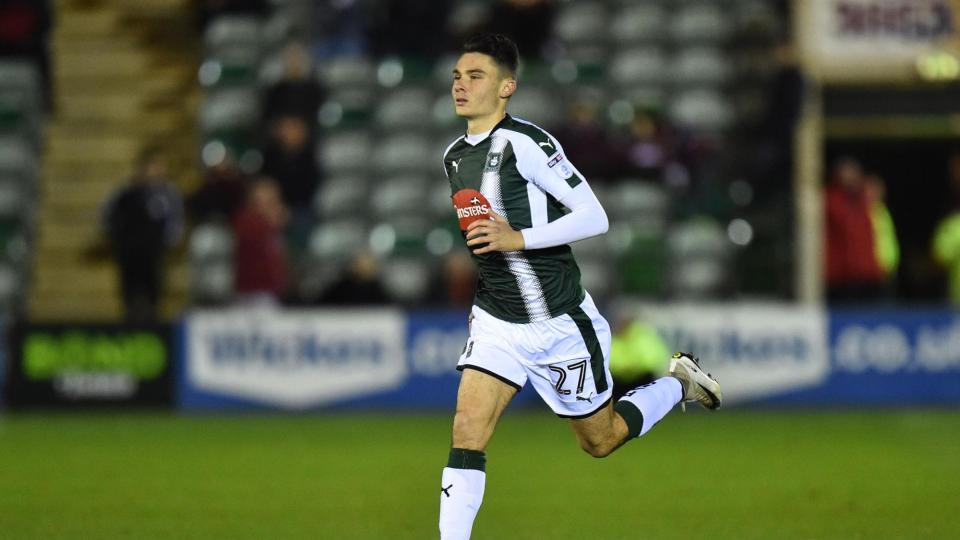‘The Pilgrim’, Argyle’s long-running match day programme, returns for 2024/25, with a host of new and exclusive features.
Issue One features new Head Coach, Wayne Rooney, in an exclusive interview, where he discusses his past, his present and his future. The front cover, the first in a series through the season, shows Rooney in a famous celebration pose, but wearing a retro Argyle kit. Stay tuned to see other Argyle personalities in new guises on covers throughout the season.
We also have an interview with Alex Fletcher, the former Pilgrim who has recently had to retire aged 25, after suffering serious head trauma in a match in 2022. You can read an excerpt of this interview, below.
Brand new features include profiles of Pilgrims around the world; a fun look at chants you may hear in Home Park; the Argyle Archive bring us a glimpse into their collection; we look back on the retro kit featured on the front cover, and more. There is also as the traditional stats, games, photos, opposition guide and so much more, packed into a perfect-bound 68 pages.
For information on how to buy the programme, and how to subscribe, click here.
---
Speaking down the phone to Alex Fletcher, it was in my mind that he may not want to dwell on one of the worst days of his life.
Essentially, the point of the call was to talk to Alex, a Forever Green guest at today’s game against Hull City, about his recovery from a horrendous accident that did not just cost him his football career, but almost his life.
Playing for Bath City in November 2022, he collided head first with pitchside hoardings, suffering a critical head injury. He was in intensive care for 13 days, and in hospital for much longer.
How do you talk to someone and request to speak about something like that? I decided to focus on the recovery and where he is in life now, instead, but it soon became apparent that Fletcher is an extremely eloquent speaker, very comfortable and confident about whatever subject comes up.
With confidence and ease beyond his 25 years, Alex declared himself content to talk about what had happened to him, and what has followed in the subsequent 21 months or so.
To listen to him was to listen to a man with stunningly positive perspective on life, considering his life-altering circumstances.
“Personally, I’m doing really well,” he said. “I am able to live, as I call it, relatively normally. I still have a few small issues. Some might think of them as bigger issues, but I have learned to make them smaller issues, and deal with them.
“One of the biggest physical challenges I have, even now, is my balance. It’s improved enormously since my accident; it took me around two months to walk, even just stumbling around, and another two or three months on top to be able to run.
“But footballers need such high levels of balance, and even 18 months post-accident I wasn’t at the level I had before. I am also deaf in one ear, and that makes it hard to work out where defenders are, or the direction someone is shouting from.
“It’s tricky to play at a good level of football with those issues, let alone the general PTSD of what had happened. Defenders at that level aren’t known for taking any prisoners, either.
“After leaving Bath I signed for Weston-Super-Mare, and I played maybe ten games, but I didn’t feel anywhere near the level I did before. I was almost trying to get used to how I felt in my ‘new body’. Heading used to be one of my big strengths, now all of a sudden I was ducking out of headers, avoiding contact.
“In April, I had a brain scan, funded by the PFA, in a scheme we run for players which looks at the chances of suffering from a neuro-degenerative disease after players finish playing. Mine came back fine, there doesn’t seem to be long-term damage in terms of degeneration at the moment.
“However, it did show that I have damage to my cerebellum, which affects balance and co-ordination. Strangely, seeing the results of that in the scan gave me a lot of comfort, because it meant what I was feeling on the pitch was backed up by evidence. It wasn’t that I needed to work harder or get used to things, it is simply how my brain is now. And it is not going to improve.
“Once I got that feedback, it was hard to come back from it. When you have been at a certain level, and you know you can’t get back to it, as well the physical and mental side of things, you have to make a decision.
“I announced my retirement last month, and have not missed a beat since then. I see teams going back for pre-season, but I don’t really feel jealous or miss it. I have so much going on!”



